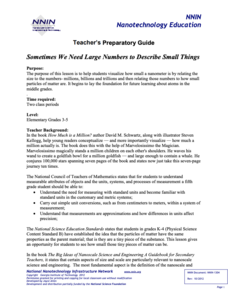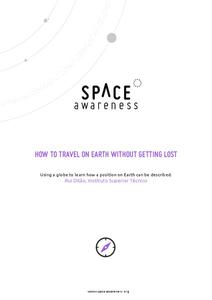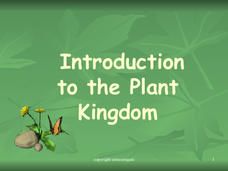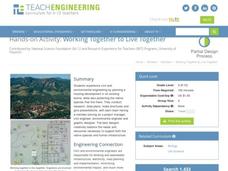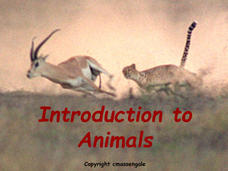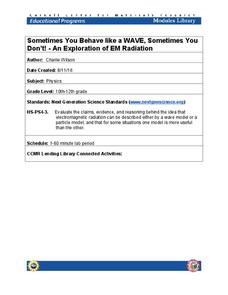National Nanotechnology Infrastructure Network
Sometimes We Need Large Numbers to Describe Small Things
String the class along to help them understand large numbers. A multi-disciplinary lesson uses literature, science, and math to look at very large numbers. Pupils conceptualize how much a million is using literature before performing a...
TED-Ed
How to Speak Monkey: The Language of Cotton-Top Tamarins
Tamarin monkey language can be categorized by stem upsweep, duration, peak frequency, and frequency change. Although other complex terminology is used to describe the 38 calls of this species, the video is easy to follow and a...
Curated OER
A Whale of Importance to the Arctic People
The bowhead whale of the Arctic region is of great importance to the people that live there. Your class will brainstorm all they know about this wonderful whale and create an informational video, which they will share with the children...
Columbus City Schools
To Measure its Mass or Volume?
Atoms, elements, and molecules, oh my! Teaching the fundamentals of chemistry to curious sixth graders has never been easier to accomplish. Here is a resource that pulls together everything needed to get them off to a good start,...
Space Awareness
How To Travel On Earth Without Getting Lost
Have you ever wanted to travel the world? Take a virtual trip with a geography lesson that uses longitude and latitude, the position of the sun, an astronomy app, and a classroom globe.
Concord Consortium
Sticking a Balloon to a Wall
This is one sticky situation! Science sleuths uncover the mystery behind a balloon that appears to be stuck to a wall using an interactive. Learners observe a neutrally charged wall before they manipulate the charge on a balloon. Atom...
Curated OER
Welcome to the Wonderful World of Machines
Designed for a lower elementary school classroom, this presentation on simple machines is a wonderful way to introduce this topic. The resource begins by identifying and defining the six types of simple machines, and then goes on to...
Biology Junction
Introduction to the Plant Kingdom
Plants provide humans with food, shelter, and medications. Scholars gain a better appreciation for plants after learning their functions, divisions, and early ancestors. Each sub-topic includes slides highlighting vocabulary and...
Curated OER
Relative Age Dating
Modeling dough and paper cutouts in science class? Learn about how relative age dating concepts, like the Law of Superposition and cross-cutting relationships, can be used to describe the formation of sedimentary layers.
NOAA
Biological Oceanographic Investigations – Call to Arms
How many simple machines does it take to make a robotic arm? An inquiry-based instructional activity explores that topic and challenges pupils to build a robotic arm that can stretch, turn, and more. A few questions help guide...
Glynn County School System
Introduction to Astronomy
Get a taste of what the study of the universe entails! A PowerPoint presentation highlights the important aspects of studying astronomy. Packed with facts and images, the presentation is sure to get your class excited about their universe.
Baylor College
A Place to Be
Home sweet home. Humans, birds, beavers, ants, we all need a place place to rest and keep us safe. In the ninth lesson of this series, the importance of shelter is discussed as the teacher reads aloud the book Tillena Lou's Day in the...
Teach Engineering
Manned Mission to Mars
To go or to not to go — the question for a mission to Mars. This resource provides details for a possible manned mission to Mars. Details include a launch schedule, what life would be like on the surface, and how the astronauts would...
Teach Engineering
Working Together to Live Together
Whose home is it anyway? Design teams plan a housing development in which they must also protect a native species. The teams consist of a project manager, civil engineer, environmental engineer, and graphic designer. Teams present their...
DiscoverE
A Clever Way to Water
Your plants will survive without you. Scholars create a device that can water plants using a coiled string. Along the way, they learn about adhesion and cohesion of water. The challenge is to keep the plants alive for at least a week.
NOAA
Introduction to the Ocean Sciences
Engage your class with a mock National Ocean Sciences Bowl. The first installment of a 23-part NOAA Enrichment in Marine sciences and Oceanography (NEMO) program provides an introduction to the ocean sciences, as well as to the rules of...
Teach Engineering
Introduction to Environmental Engineering
A series on environmental engineering introduces the class to issues that environmental engineers work to solve. This first lesson plan focuses on air and land issues, and looks at ways to reduce pollution.
National Association of Biology Teachers
Using the Discovery of the Structure of DNA to Illustrate Cultural Aspects of Science
Times have changed—and so have science practices. An introductory lesson describing the components of DNA begins with a discussion of the discovery of DNA and its perception in different cultures and genders. Scholars then learn about...
American Chemical Society
Atoms Can Be Rearranged to Make Different Molecules
Uncover the building blocks of the universe as budding chemists explore atoms and molecules in an exciting inquiry-based activity. Investigators view an interactive video describing the chemical structure of six molecules. Using...
Beyond Benign
Puzzler
Are some packaging materials superior to others? Using sustainability as a guide, scholars analyze different packing materials to describe their life cycles. They create puzzles to communicate their findings.
Curated OER
Let's Get it Together! Reading to Learn
Let’s learn about frogs! Young readers are led through “Freaky Frogs,” a non-fiction article. Teach learners how to edit an article so there are fewer details to sift through. After talking through the article, they learn the six steps...
Center for Learning in Action
Introduction to Matter
Begin your states of matter lessons with a demonstration designed to introduce the concept that all matter has properties. Reinforce this concept through vocabulary exploration, and the creation of atom models; salt, water, and carbon...
Biology Junction
Introduction to Animals
Out of all animals, elephants alone lack the ability to jump. Scholars learn all about animals using a presentation full of fun examples. It describes different types of animals, the biological similarities and differences between...
Cornell University
Sometimes You Behave Like a WAVE, Sometimes You Don't!
Electromagnetic radiation behaves like both a wave and a particle. Help classes explore this concept through a lab investigation. Young scientists create optical interference patterns on a glass slide using a carbon layer. They analyze...
Other popular searches
- Words to Describe People
- Precise Adjectives to Describe
- Writing to Describe
- Words to Describe Location
- Describe How to Get to Safety
- Words to Describe the Past
